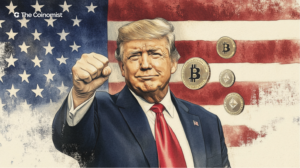How Musicians Are Turning NFTs Into Millions

Music NFTs are revolutionizing the music industry, empowering artists to protect copyrights and maximize income. Discover how tokenized albums and exclusive fan experiences enable musicians to profit from their creativity on the blockchain—and how you can do the same.
On this page
Beats on the Blockchain: A New Era of Earnings
The music industry has long balanced creativity and commerce, but now artists are tapping into a new revenue stream: NFTs. Music NFTs are unique digital assets on the blockchain that allow musicians to monetize albums, singles, and even exclusive fan experiences like never before.
Traditional streaming platforms like Spotify and Apple Music pay artists a meager $0.003-$0.005 per stream, barely enough to make a dent in production costs. In contrast, NFTs allow artists to sell directly to fans, retaining a larger share of their earnings.
Kings of Leon, Grimes, and Daniel Allan are among the artists who have cashed in on the NFT revolution. Blockchain is giving creators back control over their work. The key is simple: blending art with digital scarcity and fan loyalty creates an irresistible value. It’s not just about making money; it’s about breaking free from middlemen, record labels, and outdated monetization models.

Music NFTs: Tokens and Royalties
Music tokenization is revolutionizing the industry. Instead of earning mere pennies from streaming platforms, artists are now creating limited-edition digital copies as music NFTs and selling them directly to fans.
In 2021, Kings of Leon made history by releasing their album, When You See Yourself, as an NFT. They paired digital artwork with physical vinyl, bringing in over $2 million within days. Electronic producer 3LAU went even bigger—his tokenized album Ultraviolet sold at auction for $11.6 million. By keeping the release limited (for example, to just 50 or 100 copies), artists create exclusivity, transforming music into a collectible, much like rare vinyl or fine art.
The real revolution, however, is in royalties. Smart contracts embedded in music NFTs allow artists to earn a percentage (typically 5–20%) every time the token is resold. 3LAU continues to profit as his NFTs change hands, and Canadian artist Grimes, whose collection of music and digital art brought in $6 million, also benefits from ongoing passive income through secondary sales.
The process is simple: choose a platform like OpenSea, Zora, or Foundation, upload your track, set the royalty percentage, and publish. It’s not just a one-time sale but a long-term strategy where every resale generates income.
Of course, building a successful music career still requires significant time and investment. But that’s a story for another day.

Music NFTs: Fans and Crowdfunding
Music NFTs aren’t just about the sound—they’re about building emotional connections and deepening fan loyalty. By adding exclusive experiences to their tokens, artists are transforming fans into investors and dedicated supporters.
Kings of Leon offered “golden tickets” with lifetime front-row seats to their concerts—an irresistible draw for any superfan. Avenged Sevenfold took it further with their Deathbats Club NFTs, granting access to private Discord channels and virtual meetups in the Metaverse, creating an exclusive community experience. Meanwhile, Post Malone kept it straightforward yet impactful by selling a signed vinyl as an NFT for $50,000.
The power of exclusivity and personal engagement is what drives fans to invest. Platforms like Sound.xyz allow artists to tokenize unique experiences like backstage passes, virtual Q&A sessions, or even a shoutout in a song.
NFTs are also changing the game for crowdfunding.
Indie artist Daniel Allan raised $140,000 in just one day by selling 50% of future royalties from his album Overstimulated. This turned his fans into partners, giving him the funds to create music without depending on a record label. It’s like a next-level Kickstarter—supporters don’t just get merch; they get a share of the artist’s success. Platforms like Royal make this easy, allowing artists to offer revenue shares and promote their projects through Twitter and Discord. But the key to success is trust. A dedicated fanbase is the foundation of this model, making fan loyalty more valuable than ever.

How to Create Your Own Music NFT
Creating a music NFT is easier than you might think—all you need is a laptop and a creative idea.
Start by picking the best platform for your needs. OpenSea is the largest and most versatile marketplace, known for its user-friendly interface, but be mindful of high fees. Catalog is designed specifically for music, making it perfect for audio-focused projects. Royal is great for managing royalties and crowdfunding, while Zora offers the most flexibility for customizations.
Next, get your content ready. Start with a high-quality audio file in MP3 or WAV format—the better the sound, the better the listener's experience. Make it more appealing with a visual element like cover art, an animation, or a short video to grab attention. If you're including extras like virtual concert access, early demos, or physical merchandise, make sure to highlight them in the description. Decide on the number of tokens to create—whether it's a one-of-a-kind auction piece or a limited series for broader reach.
The technical journey begins with setting up a crypto wallet. MetaMask is a popular choice—install it as a browser extension and fund it with Ethereum (ETH) via an exchange like Binance or Coinbase. An initial investment of $100–200 is usually enough to get started. Connect your wallet to the chosen platform, upload your files, and fill in the necessary details: title, description, edition size, and pricing (either a fixed price or “From $100”). In the smart contract, set the royalty percentage—10% on resales is a common rate. Click “Mint” to create the token on the blockchain. Be prepared to pay a gas fee (the Ethereum transaction fee), which can range from $10 to $150 depending on network traffic and the time of day. Once completed, your NFT will appear in your wallet.
And remember: promotion is everything. Announce your launch on Twitter, Discord, or Telegram—these platforms are where crypto enthusiasts and collectors of unique tokens gather. Kings of Leon leveraged media buzz, Grimes added visual flair, and Allan built a loyal community through social media.
Start small—with one track or a limited series. Test the waters, see how your audience reacts, and only then consider scaling up. Mistakes like high gas fees or insufficient hype are valuable lessons that help you adapt quickly.
Music NFTs are redefining how artists monetize their talent. Tokenization turns music into collectible assets, exclusivity deepens fan connections, royalties provide ongoing income, and crowdfunding brings creative visions to life. Artists can earn 50–90% of sales, leaving behind the meager earnings from streaming platforms. It’s about revenue, control, and a future where musicians are no longer at the mercy of producers but in control of their destiny.
The blockchain is open, and the opportunities are limitless. It’s time to take the stage and seize the moment.
The content on The Coinomist is for informational purposes only and should not be interpreted as financial advice. While we strive to provide accurate and up-to-date information, we do not guarantee the accuracy, completeness, or reliability of any content. Neither we accept liability for any errors or omissions in the information provided or for any financial losses incurred as a result of relying on this information. Actions based on this content are at your own risk. Always do your own research and consult a professional. See our Terms, Privacy Policy, and Disclaimers for more details.




















